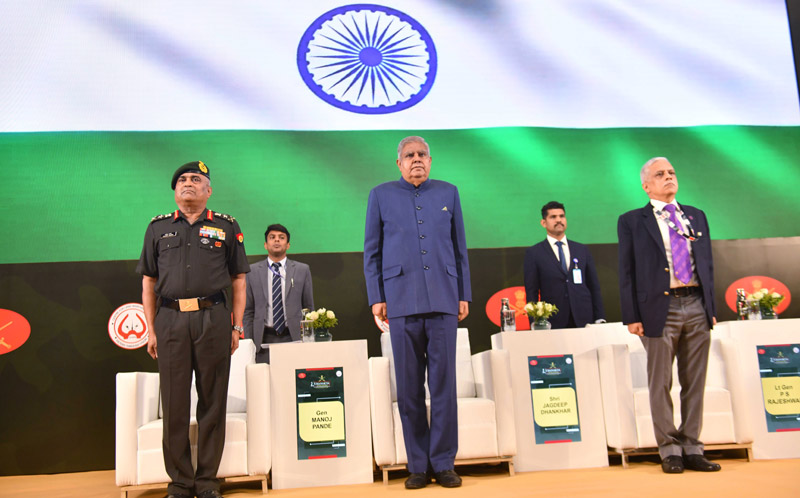India to set-up defence wings across the world, says army chief, Gen. Manoj Pande
Mohammad Asif Khan
The chief of army staff General Manoj Pande said on November 3 that army would set-up defence wings in friendly foreign countries in the West to boost its defence cooperation efforts. He announced this during the Chanakya Defence Dialogue, a national security event held at the Maneckshaw Centre in New Delhi.

“We are establishing Defence Wings at new locations across the world. Our national resolve to achieve self-reliance in defence hardware is also being enabled by a resurgent Indian defence Industry,” he said, at the event jointly organised by the Indian Army and the Centre of Land Warfare Studies.
The Dialogue that took place on the 3rd and 4th November 2023, was a comprehensive analysis of security challenges in South Asia and the Indo-Pacific. It focused on crafting a roadmap for collaborative security measures in the region to fortify India’s position as a ready, resurgent, and relevant stakeholder among the nations of this world.
This announcement comes as part of shaping India’s first national security strategy, According to The Indian Express, the National Security Council Secretariat (NSCS) is currently working on a thorough National Security Strategy in collaboration with various Central ministries and departments. Subsequently, it will be presented for final Cabinet approval. This announcement comes at a time when India has become a key US ally in Southeast Asia and the Indo-Pacific region where both China and the US want to gain influence.
India’s role in the Indo-Pacific region is seen as vital by countries like Australia, Japan, and the United States. However, India’s maritime security has traditionally not been a top priority, due to its focus on continental threats. The Indo-Pacific region is a new area for India’s foreign policy, and it represents a shift in India’s strategic environment, from focusing on continental threats to also including maritime threats.
“India shares common interests and values such as democracy, human rights, and the rule of law with India’s partners and like-minded countries. This alignment of shared values creates a solid foundation for cooperative security efforts” said Gen. Pande.
The US State Department has announced that US Secretary of State Antony Blinken and US Defense Secretary Lloyd Austin will travel to New Delhi next week for a ‘2+2’ meeting with external affairs minister S. Jaishankar and defence minister Rajnath Singh. Secretaries Blinken and Austin are expected to meet Prime Minister Narendra Modi after the ministerial meetings according to the US department of defence.
A ‘2+2’ meeting is a high-level meeting between the foreign and defence ministers of two countries. It is an important opportunity for the two countries to discuss their strategic and security priorities, and to strengthen their cooperation in these areas.
The upcoming ‘2+2’ meeting between the US and India is particularly significant, given the growing importance of the Indo-Pacific region and the close strategic partnership between the two countries. The two sides are expected to discuss a range of issues, including maritime security, defence cooperation, and counter-terrorism.
India is set to increase Intra-operability or Tri-services synergy in cooperation with the United States which is important for theaterisation. Interoperability means that all of the different systems can communicate and share information. The army, navy, and air force will work together as a team to protect the nation’s interests across all spectrums of conflict. To be successful in future wars, all weapon systems, electronic systems, and communication systems must be able to work together seamlessly.
Gen. Pande expressed the army’s eagerness to expand the range and magnitude of collaborative military training and exercises with allied foreign nations. He remarked, “The interconnected world that we once praised is now facing challenges. It is shifting towards disconnection, reducing risks, and potentially de-globalizing. Amid such discouragement, I hold the belief that India continues to shine as a ‘bright spot’.”
The army chief’s address was followed by three sessions. Speakers in these sessions included Arvind Virmani from the Niti Aayog, Prof. Ajay Kumar Sood, Principal Scientific Advisor to the government of India and Ambassador V Misri (deputy NSA), apart from several retired senior army officers. Some of the foreign panellists included Lisa Curtis (senior fellow and director of the Indo-Pacific Security Program at CNAS), Dr Satoru Nagao (Japan), Dr Paco Milhiet (France), Ambassador Shamsher M Chowdhury (Bangladesh), Asanga Abeyagoonasekera (Sri Lanka), Chiran Jung Thapa (Nepal), Vice Admiral Amarulla Octavian (Indonesia) and Dr R De Castro (The Philippines).

